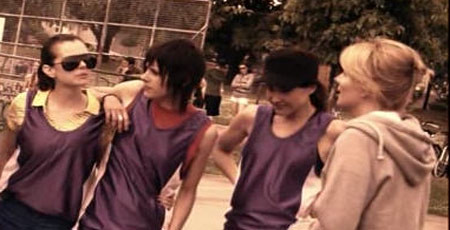(Note: This post contains spoilers for The L Word.)
In the comments of Wednesday's post, Anita pointed out that Queer As Folk is not the only Showtime program that struggles in its depiction of bisexuality. When discussing depictions of biphobia in the gay community, one can't avoid The L Word. The difference between the shows as I see it, however, is that if Queer As Folk suffers from bi invisibility, The L Word suffers from straight-up bi loathing. Rather than giving you a play-by-play of every epic bi fail (if you're interested in that, After Ellen has a comprehensive list), I want to focus on one particular episode—one that deals with bisexuality and straight privilege.
I use the phrase "deals with" lightly, because what could have been an interesting and worthwhile topic to explore is summed up in one brief, clumsy scene. In the Season Four episode "Layup," Tina, a main character who is on the outs with her friends after leaving her partner for a man, shows up to a pick-up basketball game in which her friends are playing. Her friends, unaware she was going to show up, inform her that she can't play because the game is only for lesbians. (Which makes no sense, because Kit, a straight woman, and Alice, a bi woman, are playing.) Tina replies that she still identifies as a lesbian, so it's okay. But this upsets Jenny (a character who was bi-identified during the show's first season, if I'm not mistaken), who informs Tina, "Yeah, but when you walk down the street with your boyfriend, holding your boyfriend's hands and enjoying all the heterosexual privileges, you stopped being a lesbian." Tina explains that she's a political lesbian, and then there's some more arguing, until finally the other team tells Tina that they don't care who she sleeps with and invites her to play. In a karmic twist, the inclusive team wins and Tina's friends, if she can even call them that after this, lose. (Though this ultimately has far more to do with the fact that Tina's friends are terrible at basketball.)

The way the scene is written and structured into the episode lacks critique. It plays like a weird, queer version of "Rudolph the Red-Nosed Reindeer," in which Tina isn't allowed to play in any lesbian games. There's cattiness and meanness, but it isn't condemned. There's no attempt to teach Jenny that it's okay for a woman to sleep with a man and still call herself a lesbian. Nor is there any attempt to teach Tina the reasons why calling herself a lesbian may bother some lesbians who don't sleep with men. The scene exists for tension and drama, not character growth for either party.
And that's too bad, because this is a scene that I think could have been powerful and effective. Rather than making both Jenny and Tina look bad, it could have been a thoughtful conversation about the reasons why using a label for political reasons is important, but why recognizing privilege is also important. Does sleeping with men actually mean that a queer-identified woman can't call herself a lesbian? What are the implications behind Tina's decision to continue calling herself a lesbian, rather than bisexual or queer? Rather than both appearing to be out of line, is it possible that both of them are actually right, for different reasons? These are questions I would have liked seeing explored. Because this issue is actually really important.
Personally, I don't think straight privilege should be enough to prevent a queer woman from joining a lesbian basketball team, but the fact is, this is a story that plays out in the real world. Bi people (or, in the case of Tina, people who don't fit neatly into the boxes of Kinsey 0 heterosexuality and Kinsey 6 homosexuality) are sometimes excluded from gay communities, just like they are from straight communities, and for The L Word to address that reality is critical. However, it would have been more effective if they had placed an emphasis on challenging beliefs and perspectives, rather than solely creating dramatic tension for the sake of dramatic tension.
The struggle to still remain a part of a community to which you feel connected while actively benefiting from privilege that oppresses others is an important one to explore. It's one that I think about often and have written about before. I'm glad The L Word made an attempt to address it, but it deserved far better treatment than it got.
Related:"The L Word" Reinforces Negative Bisexual Stereotypes
Previously:Queer As Folk Broke My Heart, John Irving Tackles Biphobia in New Novel